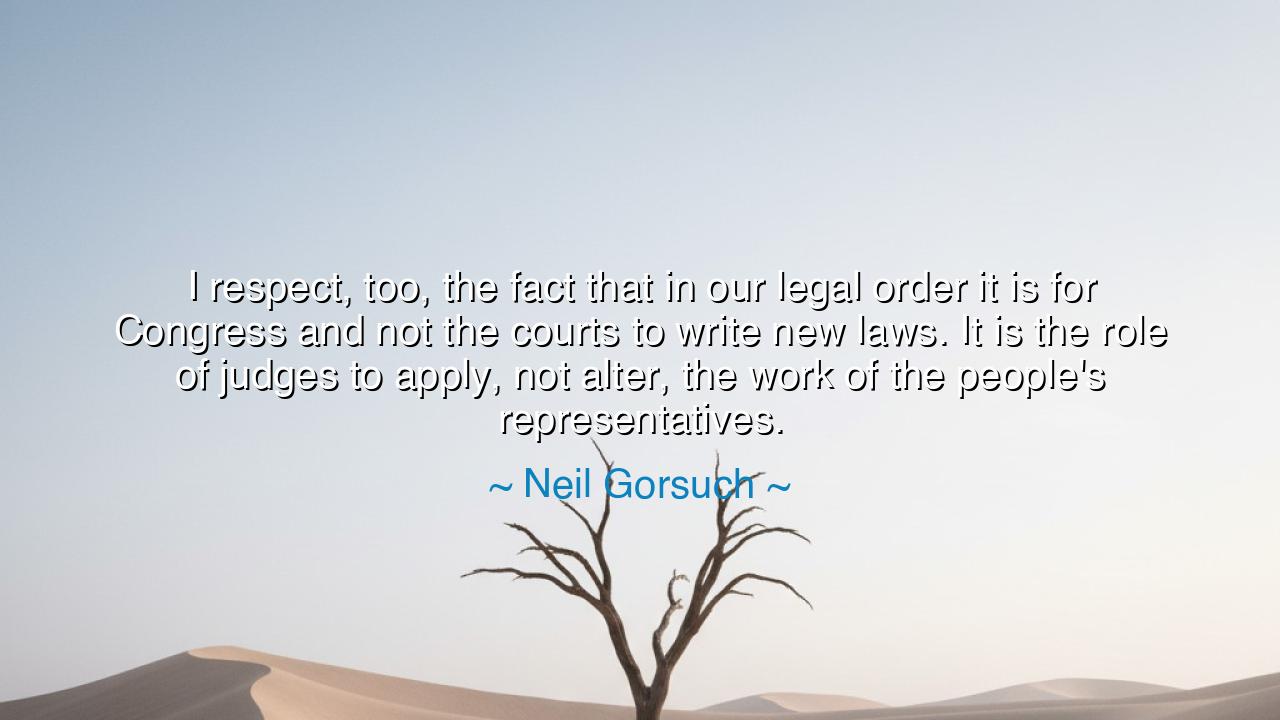
I respect, too, the fact that in our legal order it is for
I respect, too, the fact that in our legal order it is for Congress and not the courts to write new laws. It is the role of judges to apply, not alter, the work of the people's representatives.






Hear the words of Neil Gorsuch, spoken with solemn reverence for the architecture of the Republic: “I respect, too, the fact that in our legal order it is for Congress and not the courts to write new laws. It is the role of judges to apply, not alter, the work of the people’s representatives.” These words, though simple in form, ring with the weight of centuries of struggle over the balance of power. They are a declaration of humility, a reminder that the robe of the judge is not the crown of the king.
The meaning of this quote lies in the sacred separation of powers that forms the beating heart of democracy. Congress, born of the people, speaks through laws crafted by elected representatives. The courts, by contrast, are guardians, interpreters, and arbiters, but never creators of law. To cross that boundary is to invite disorder—to turn judges into legislators, and to strip the people of their rightful voice. Gorsuch thus calls for discipline: that the judiciary must not grasp at powers not its own, lest the order of the republic fall into imbalance.
The origin of these words rests deep in the American Constitution, which sought to bind power with chains of separation. The framers, weary of kings and tyrants, feared both the weakness of law and the overreach of judges. They gave the pen of legislation to Congress, the sword of enforcement to the executive, and the scale of judgment to the courts. Gorsuch’s words reflect a philosophy long held by conservatives and strict constitutionalists: that judges must be faithful servants of the written law, not sculptors who remake it in their own image.
History itself provides warning of what happens when these boundaries blur. In ancient Rome, when the Senate grew weak and magistrates bent the law to their own desires, Caesar rose as both lawgiver and ruler, and the republic crumbled into empire. In contrast, the American republic has endured for centuries precisely because its branches of government, though often in tension, have respected their limits. Gorsuch’s words stand in this tradition, echoing the wisdom that liberty is preserved not by unrestrained power, but by power restrained.
The lesson is clear: humility in power is the foundation of freedom. A judge who respects his role protects the people, for he ensures that their voice—expressed through their representatives—remains supreme in lawmaking. A Congress that legislates boldly yet responsibly gives shape to the will of the nation. Each branch must honor its boundaries, for when one grasps too far, the balance is broken, and tyranny finds its opening.
What then must we do? As citizens, we must hold our lawmakers accountable, for if Congress grows silent or divided, the temptation for judges to step into their place will grow. We must also demand that our judges remain faithful to their charge: not to bend the law to personal opinion, but to interpret it with integrity. And in our own lives, we must learn this same discipline—to honor the boundaries of our duties, to serve faithfully within our roles, and to act with humility even when power lies within our grasp.
Thus, remember Neil Gorsuch’s words: “It is the role of judges to apply, not alter, the work of the people’s representatives.” Pass this wisdom to future generations—that power, unchecked, corrodes, but power restrained by respect for order sustains liberty. Teach them that the greatness of a republic is not in the might of its rulers, but in the humility of its servants, who know that their duty is not to themselves, but to the people and to the enduring rule of law. For in this discipline lies the secret of freedom’s survival.






AAdministratorAdministrator
Welcome, honored guests. Please leave a comment, we will respond soon